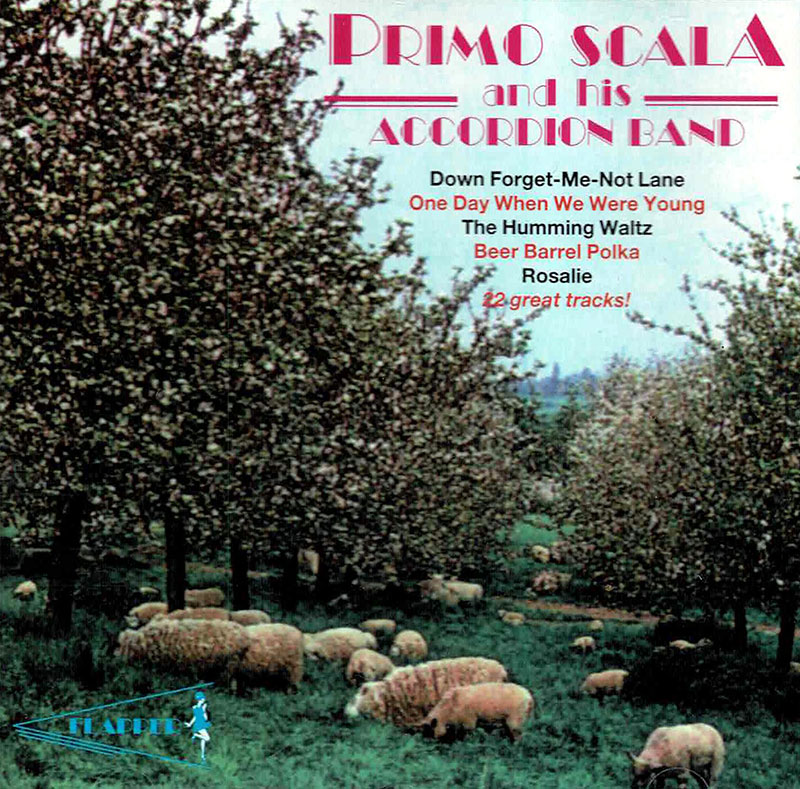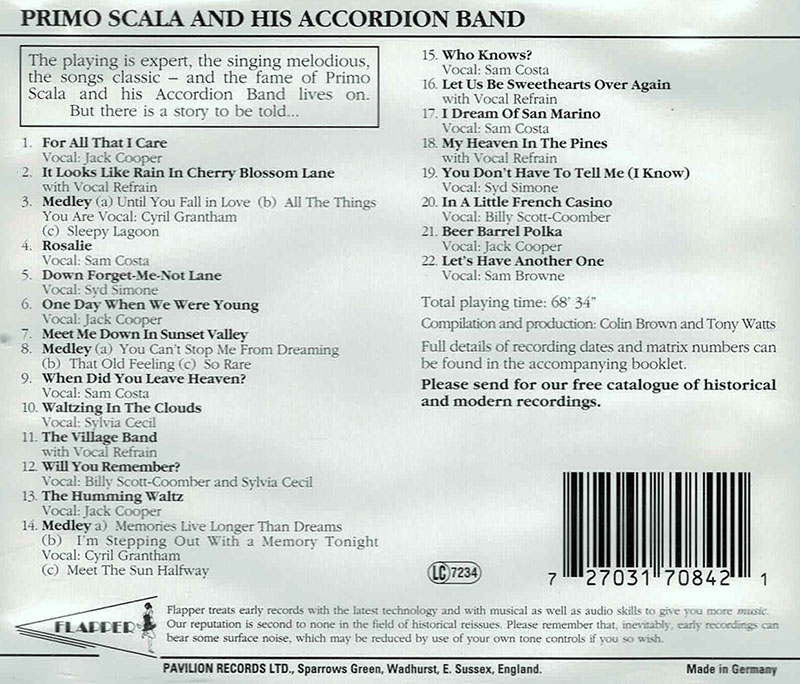Logowanie
OSTATNI taki wybór na świecie
Nancy Wilson, Peggy Lee, Bobby Darin, Julie London, Dinah Washington, Ella Fitzgerald, Lou Rawls
Diamond Voices of the Fifties - vol. 2
Tylko 1000 egzemplarzy!!!
DVORAK, BEETHOVEN, Boris Koutzen, Royal Classic Symphonica
Symfonie nr. 9 / Wellingtons Sieg Op.91
nowa seria: Nature and Music - nagranie w pełni analogowe
Petra Rosa, Eddie C.
Celebrating the art and spirit of music - vol. 3 - Pure
warm sophisticated voice...
Peggy Lee, Doris Day, Julie London, Dinah Shore, Dakota Station
Diamond Voices of the fifthies
Tylko 1000 egzemplarzy!!!
SAMPLER - STS DIGITAL, Buddy Tate, Milt Buckner, Walace Bishop
Jazz Masters - Legendary Jazz Recordings - v. 1
proszę pokazać mi drugą taką płytę na świecie!
Chesky! Niezmiennie perfekcyjny
Winylowy niezbędnik
ClearAudio
Double Matrix Professional - Sonic
najbardziej inteligentna i skuteczna pralka do płyt winylowych wszelkiego typu - całkowicie automatyczna
Primo Scala and His Accordion Band
Primo Scala and His Accordion Band

- 1. For All that I Care
- 2. It Looks Like Rain In Cherry Blossom Lane
- 3. Medley
- a) Until You Fall in Love
- b) All The Things You Are
- c) Sleepy Lagoon
- 4. Rosalie
- 5. Down Forget-Me-Not Lane
- 6. One Day When We Were Young
- 7. Meet Me Down In Sunset Valley
- 8. Medley
- (a) You Can't Stop Me From Dreaming (Friend, Franklin)
- (b) That Old Feeling (Fain, Kahal)
- (c) So Rare (Sharpe, Herst)
- 9. When Did You Leave Heaven?
- 10. Waltzing in The Clouds
- 11. The Village Band
- 12. Will You Remember?
- 13. The Humming Waltz
- 14. Medley
- (a) Memories Live Longer Than Dreams (Parker, Charles)
- (b) I'm Stepping Out With a Memory Tonight (Wrubel, Magidson) Vocal: Cyril Grantham
- (c) Meet The Sun Halfway (Burke, Monaco)
- 15. Who Knows? (Porter)
- 16. Let Us He Sweethearts Over Again
- 17. I Dream Of San Marino (Shields)
- 18. My Heaven In The Pines
- 19. You Don't Have To Tell Me (I Know)
- 20. In A Little French Casino
- 21. Beer Barrel Polka
- Primo Scala and His Accordion Band - orchestra
Every now and then a problem confronts the sleeve note writer that proves all but insoluble. In theory it should be simple; accordion bands have been popular for many years and Primo Scala led one of the most famous Of them ... but ...Just to let you, dear reader, into a little trade secret: you see Primo Scala did not actually exist- which makes writing a wide-ranging biographical none on the maestro well-nigh impossible. For many years Gcoff Love recorded under his own name as well as the far more exotic sounding Manuel and his Music Of the Mountains. On the majority of recordings made by the supposed Primo Scala, the group was actually headed by the noted musician and bandleader (the two are not mutually exclusive) Harry Bidgood. It would be the simplest thing in the world to invent a whole curriculum vitae for the imaginary Scala: to reveal how he studied with Toscanini at the conservaroire in Milan, played cello in the orchestra at La Scala and was embarking on a potentially exciting career in classical music before, like St. Paul on the road to Damascus, .suddenly, in a blinding flash, realizing that his true métier lay in playing the piano-accordion... and so on. However such false information tends to be perpetuated in other, less SMIPUIOUS publications and the present writer would hate to see any of his harmless little flights of fancy presented its hard fact in music dictionaries and sleevenores for years to come. So having decided that honesty is the best policy, it would perhaps, be interesting to detail one or two similar tricks that have been played on the unsuspecting record buying public almost since Thomas Edison first developed the medium. Particularly in the 'twenties and 'thirties, the major record labels regularly employed a number of bands (often recruited Solely for recording purposes) and singers that acted as 'House artists' for that company. Noted examples who, for the most part, recorded under their own name were Ray Noble with the New Mayfair Dance Orchestra far HMV, the abiquitos Jay Wilbur for a number of labels including Rex, the Firman brothers, Ben and John, for Zonophone, Harry Hudson for Edison Bell Winner and the aforementioned Harry Bidgood for Broadcast. These groups would record hundreds of sides each year both as band performances and accompanying the company's contracted vocalists. The singers themselves were equally likely to have their identity hidden under any number of `noms de Bisques'. That famous strolling vagabond Cavan O'Connor made discs under many names other than his own, including Cliff Connelly among his innumerable aliases. George Baker, whose career on disc lasted for some sixty years, recorded rile `Serious' parts of his vast repertoire, such as opera and song, under his own name while assuming all sons of identities for more popular music. At titnes lie, together with suds stalwarts as Violet Essex and Nellie Walker, was hidden under a nchUIOUS title as a member of 'The Light Opera Company' Which would perform anything and everything from Gilbert and Sullivan to Ro dgers and Hart. Even such a famous performer as Peter Dawson was not immune from being a party to this hoodwinking of record buyers. During his `galley years' be could be heard in lighter music as Frank Danhy or as Will Strong in a series Of music hall numbers. A Scottishsounding gentleman Hector Grant, credited for records of songs made famous by Sir Harry Lauder, was also actually the Australian bass-baritone He must have been able to subdue his native Antipodean twang in convincing fashion for he even appeared on the halls, splendid in regulation whiskers and kilt, uncle, the name of Grant; the true 'Laird of the I falls' was not amused Dawson even extended his 'sub rosa' activities to songwriting, for the celebrated ballad Boots hart Kiplings words set to music by a certain J.P. McColl who, it is rumoured, bore a remarkable resemblance to Peter Dnwson! In the cut-throat world of the record industry artists have frequently 'moonlighted' uncle, assumed names in order to circumvent the often strict terms of the contracts they had signed with one label or another. Once tied to one particular company, agreements often specify the performer's exclusivity and strictly forbid bun or her from making records for a rival organisation. Marry were the danceband leaders or vocalists whose work suddenly appeared on another label under a different © 1995 REG SPODE:





























